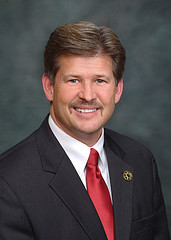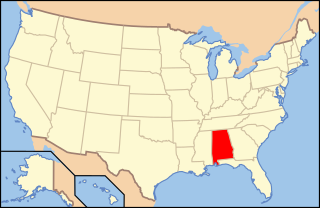
Radley Prescott Balko is an American journalist, author, blogger, and speaker who writes about criminal justice, the drug war, and civil liberties. In 2022, he began publishing his work on Substack after being let go from The Washington Post, where he had worked as an opinion columnist for nine years. Balko has written several books, including The Rise of the Warrior Cop and The Cadaver King and the Country Dentist.
In response to court action in a number of states, the United States federal government and a number of state legislatures passed or attempted to pass legislation either prohibiting or allowing same-sex marriage or other types of same-sex unions.
The Uniform Child Abduction Prevention Act ("UCAPA") is a Uniform Act drafted by the National Conference of Commissioners on Uniform State Laws (NCCUSL) and submitted for enactment by jurisdictions within the United States in 2006. This uniform law originated by the parents of internationally abducted children, and parents fearing their children would be abducted.
State Registered Domestic Partnerships (SRDP) in Washington were created in 2007 following the Andersen v. King County decision. Subsequent legislation has made an SRDP the equivalent of marriage under state law. As a result of the legalization of same-sex marriage in the state, from June 30, 2014, SRDP will be available only when at least one of the partners is sixty-two years of age or older.

Steve King is an American politician who served in the Colorado House of Representatives as a Republican in 2006 and served until January 2011. King was elected to the Colorado Senate in 2010, and was sworn in January 2011. He represented Senate District 7 which includes Mesa County and part of Garfield County. He did not run for reelection to the State Senate in 2014, so his term ended in January, 2015.

Caylee Marie Anthony was an American girl who lived in Orlando, Florida, with her mother, Casey Marie Anthony, and her maternal grandparents, George and Cindy Anthony. On July 15, 2008, she was reported missing in a 9-1-1 call made by Cindy, who said she had not seen Caylee for 31 days and that Casey's car smelled like a dead body had been inside it. Cindy said Casey had given varied explanations as to Caylee's whereabouts before finally telling her that she had not seen Caylee for weeks. Casey lied to detectives, telling them Caylee had been kidnapped by a nanny on June 9, and that she had been trying to find her, too frightened to alert the authorities. She was charged with first-degree murder in October 2008 and pled not guilty.

The Fifty-second Oklahoma Legislature was the meeting of the legislative branch of the government of Oklahoma in Oklahoma City from January 3, 2009, to January 4, 2011, during the second two years of the second administration of Governor Brad Henry. It was the first session in state history where the Republican Party has controlled both houses of the legislature.

Lesbian, gay, bisexual, and transgender individuals in Alabama face legal challenges and discrimination not experienced by non-LGBTQ Alabamians. LGBTQ rights in Alabama—a Republican Party stronghold located in both the Deep South and greater Bible Belt—are limited in comparison to most other states.

Capital punishment is a legal penalty in the U.S. state of Florida.
The legal status of Salvia divinorum in the United States varies, with 29 states having completely banned it and others considering proposals for banning its use.
The timeline of the Casey Anthony case chronicles the events surrounding the death of Caylee Marie Anthony and the trial of her mother, Casey Anthony.
Linda Drane Burdick was the Chief Assistant State Attorney at the Orange and Osceola County State Attorney's Office in Orlando, Florida. She was the lead prosecutor on the State of Florida vs. Casey Anthony case.

The Fifty-fourth Oklahoma Legislature was the meeting of the legislative branch of the government of Oklahoma from January 8, 2013 to January 5, 2015. The first session met from February 4, 2013, to May 24, 2013, in the Oklahoma State Capitol in Oklahoma City, during the third year of the first administration of Governor Mary Fallin. After the 2012 elections, the Republican Party held more than two-thirds of the seats in the Oklahoma Senate and the Oklahoma House of Representatives.

The Forty-eighth Oklahoma Legislature was a meeting of the legislative branch of the government of Oklahoma, composed of the Senate and the House of Representatives. It met in Oklahoma City from January 2, 2001 to January 7, 2003, during the second two years of the second term of Governor Frank Keating.
Texas House Bill 2 (HB2) is a bill within the Eighty-third Texas Legislature, first introduced into the Texas Senate as Texas Senate Bill 5 (SB5) on June 11, 2013, related to abortion rights within the state. Among provisions include banning abortions 20 weeks post-fertilization, and mandating that doctors practicing abortions must have admitting privileges at a nearby hospital.

A six-week abortion ban or early abortion ban, called a "heartbeat bill" or "fetal heartbeat bill" by proponents, is a form of abortion restriction legislation in the United States. These bans make abortion illegal as early as six weeks gestational age, which is when proponents claim that a "fetal heartbeat" can be detected. Medical and reproductive health experts, including the American Medical Association and the American College of Obstetricians and Gynecologists, say that the reference to a fetal heartbeat is medically inaccurate and intentionally misleading because a conceptus is not called a fetus until after ten weeks of pregnancy, before which the proper term is an embryo, as well as that at six weeks the embryo has no heart, which at that stage is only a group of cells which will become a heart. Medical professionals advise that a true fetal heartbeat cannot be detected until around 17 to 20 weeks of gestation when the chambers of the heart have become sufficiently developed.

Matthew Daniel Rinaldi is an American attorney and politician serving as the chairman of the Republican Party of Texas. Rinaldi was a member of the Texas House of Representatives for district 115 in Dallas County from 2015 to 2019 when he was defeated by Democrat Julie Johnson.
A bathroom bill is the common name for legislation or a statute that denies access to public toilets by gender or transgender identity. Bathroom bills affect access to sex-segregated public facilities for an individual based on a determination of their sex as defined in some specific way, such as their sex as assigned at birth, their sex as listed on their birth certificate, or the sex that corresponds to their gender identity. A bathroom bill can either be inclusive or exclusive of transgender individuals, depending on the aforementioned definition of their sex. Single occupant unisex public toilets are one option to avoid this controversy.
Abortion in Texas is illegal in most cases. A trigger law has been in effect since August 25, 2022, which bans abortion in all cases except to save the life of the mother.

Rise of the Warrior Cop: The Militarization of America's Police Forces is a 2013 book written by investigative journalist Radley Balko and focuses on the subject of militarization of police in the United States.










